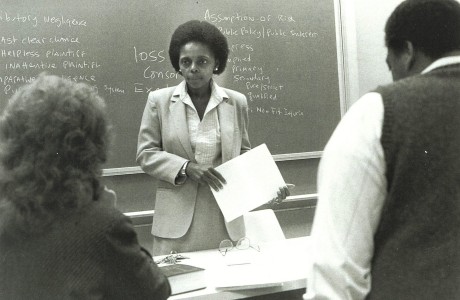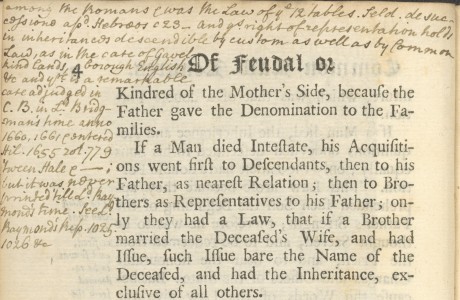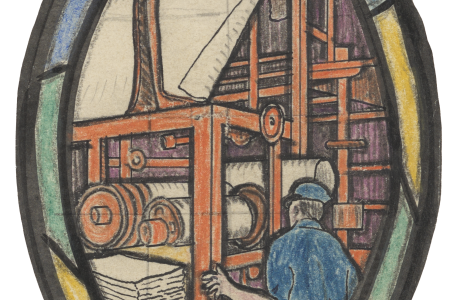2008 gifts: a John Marshall letter
 To ring in the New Year, I’d like to acknowledge the outstanding gifts to the Lillian Goldman Law Library’s Rare Book Collection in 2008.
To ring in the New Year, I’d like to acknowledge the outstanding gifts to the Lillian Goldman Law Library’s Rare Book Collection in 2008.
I begin with a superb letter written by the great Chief Justice of the U.S. Supreme Court, John Marshall, in April 1835 (only a few months before Marshall’s death), to James Kirke Paulding, whose Life of Washington was published later that year. In the letter Marshall recounts how George Washington convinced him to begin his career in public service 37 years earlier. The letter is a gift from Charles J. Tanenbaum (LL.B. Yale 1937).
At right is an image of the last page with Marshall’s autograph; below is a transcription of the entire letter (postmarked Richmond, Virginia, April 4), followed by a list of resources.
J. K. Paulding esquire
New York
Sir
Your favor of the 22d of March was received in the course of the mail, but I have been confined to my room, and am only now resuming my pen.
The single difficulty I feel in complying with your request arises from my repugnance to any thing which may be construed into an evidence of that paltry vanity which, if I know myself forms no part of any character. To detail any conversation which might seem to intimate that General Washington considered my engaging in the political transactions of the United States an object of sufficient consequence to induce him to take an interest in effecting it, may look like boasting that I held a more favorable place in the opinion of that great man than the fact would justify. I do not however think that this, perhaps, fastidious feeling would justify a refusal to answer an enquiry made in terms entitled to my sincere acknowledgements.
All who were then old enough to notice the public affairs of the United states, recollect the arduous struggle of 1798 and 1799. General Washington, it is well known, took a deep interest in it. He believed that the real independence, the practical self government of our country, depended greatly on its issue[?] on our resisting the encroachments of France.
I had devoted myself to my profession, and, though actively and zealously engaged in support of the measures of his administration in the legislature of Virginia, had uniformly declined any situation which might withdraw me from the bar. In 1798 I was very strongly pressed by the federalists to become a candidate for Congress, and the gentleman of that party who had offered himself to the district [*], proposed to resign his pretensions in my favor. I had however positively refused to accede to the proposition, and believed that I could not be induced to change my determination. In this state of things, in August or September 1798 as well as I recollect, I received an invitation from General Washington to accompany his nephew, the late Judge Washington on a visit to Mount Vernon. I accepted this invitation and remained at Mount Vernon four or five days. During this time the walk and conversation in the Piazza mentioned by W. Lewis took place.
General Washington urged the importance of the crisis, expressed his decided conviction that every man who could contribute to the success of sound opinions was required by the most sacred duty to offer his services to the public and pressed me to come into the Congress of the ensuing year.
After the very natural declaration of distrust in my ability to do any good, I told him that I had made large pecuniary engagements which required close attention to my profession, and which would distress me should the emoluments derived from it be abandoned. I also mentioned the assurance I had given to the gentleman then a candidate, which I could not honorably violate.
He thought that gentleman would still willingly withdraw in my favor, and that my becoming a member of Congress for the present, would not sacrifice my practice as a lawyer. At any rate the sacrifice might be temporary.
After continuing the conversation for sometime, he directed my attention to his own conduct. He had withdrawn from office with a declaration of his determination never again, under any circumstances, to enter public life. No man could be more sincere in making that declaration, nor could any man feel stronger motives for adhering to it. No man could make a stronger sacrifice than he did in breaking a resolution thus publicly made, and which he had believed to be unalterable. Yet I saw him, in opposition to his public declaration, in opposition to his private feelings, consenting under a sense of duty, to surrender the sweets of retirement, and again to enter the most arduous and perilous station which an individual could fill.
My resolution yielded to this representation after remarking that the obligation which had controuled[?] his course was essentially different from that which bound me - that no other man could fill the place to which his country had called him, whereas my services could weigh but little in the political balance, I consented to become a candidate, and have continued, ever since my election, in public life.
This letter is intended to be private, and you will readily perceive the unfitness of making it public. It is written because it has been requested in polite and obliging terms, and because I am willing, should your own views induce you to mention the fact derived from W. Lewis, to give you the assurance of its truth.
With my great respect I am Sir
your obed.t serv.t
J Marshall
- Three English law reports in our Rare Book Collections bear Marshall’s inscriptions and marginal notes: Hobart’s Reports (London, 5th ed. 1724), Strange’s Reports (London, 1755), and Vernon’s Chancery Reports (London, 1726-1728). We also have vol. 1 of the abridged edition of Marshall’s Life of George Washington (Philadelphia, 1832), inscribed by Marshall to his fellow Supreme Court Justice Smith Thompson.
- James Kirke Paulding (1778-1860) was a prominent early American author who later served as Secretary of the Navy. See his biographical sketch in Wikipedia. There are several biographies of Paulding, the most recent being Ralph M. Aderman & Wayne R. Kime, Advocate for America: The Life of James Kirke Paulding (Susquehanna University Press, 2003).
- The 1848 Aberdeen edition of Paulding’s Life of Washington is available in Google Books; a brief mention of Marshall’s meeting with Washington (without using Marshall’s name) is on pages 260-261.
MIKE WIDENER
Rare Book Librarian


